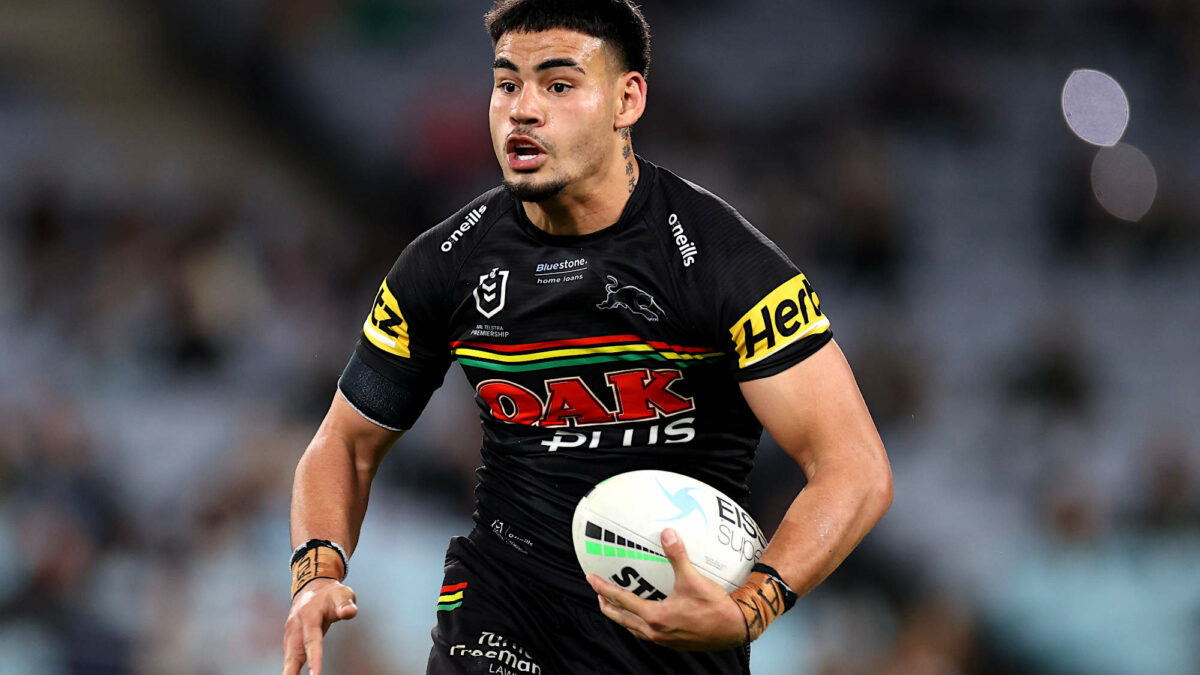
The extraordinary decision will see the winger permitted to play in the 2022 finals series, with his playing ban bizarrely now to be served in the opening two rounds of 2023.
The 21-year-old committed the offence in the aftermath of the Panthers’ 2021 grand final win and after recently being found guilty, was issued a breach notice by the NRL.
That notice subsequently led to a two-week suspension and a $7500 fine, of which half of the financial punishment will be suspended should May keep his nose clean in the near future.
Logic suggested that May would be on the pine for the short term, with the game supposedly committed to setting standards of behaviour that society, sponsors and other participants should expect.
Instead, the league has acted in a manner that stands to set the most awkward of precedents and potentially places them at the mercy of a disgruntled club faced with the prospect of entering a crucial finals match without a key player.
Moreover, the soft treatment of the poster boy Panthers is hard to ignore. Many fans across the rugby league community will be fair in asking whether the NRL has looked after one of its most dominant and popular teams.

(Photo by Cameron Spencer/Getty Images)
The cocky men from the foot of the mountains have gotten under the skin of many across the last three years, with an arrogant confidence sometimes bubbling to the point of offence. No doubt, the football behind the bravado has been superb and Penrith’s abilities are far from questionable.
However, with the likelihood of further close matches during the finals and players being cited and judiciary bound, one wonders how the governing body can possible defend the decision to suspend May’s punishment and allow him to contribute to his side’s tilt at consecutive premierships.
It is probable that a forearm or two might drift a little high in the coming weeks, reports will taken for foul play and the odd player or two could find themselves in an unfortunate position, where a missed finals match due to suspension may well end their season.
However, barring any on-field incidents, May will be amongst the fray for as long as the Penrith charge continues, whilst also being aware that he will be missing in the opening fortnight of 2023, where he will confident of his teammates covering his absence in matches far less important that what looms for the Panthers in 2022.
The statement emanating from the NRL did little to diffuse the scepticism around the entire situation, with something of an admission of guilt.
“In proposing the timing of the match suspension, the NRL considered a number of factors including when the incident took place, the date at which the proceedings were finalised and the impact of a match suspension at this time of year,” the statement read.
It is final clause of that sentence that is the kicker.
The NRL took the ramifications of a potential suspension into account when deciding May’s fate.
That effectively translates to the NRL considering the fact that the Panthers were in the finals whilst deciding the punishment and subsequently wanting May to play rather than miss out.
Of course, they still needed to apply their wet lettuce leaf discipline to the situation, thus transferring punishment to a fortnight of play that will likely have very little impact on the Panthers’ 2023 campaign.
Even considering dodgy bunker calls, ignored hip-drops and astonishingly inconsistent officiating for as long as we can all remember, this one just about takes the cake.
Whilst a few may argue that May’s error was an off-field one and that he should not be punished from a rugby league perspective, the hard fact is that the NRL have acted appropriately and connected off-field behaviour with the integrity and repute of the game.
Yet, sadly, they have dropped the ball in thinking that people are silly enough to not see behind their continued slap on the wrist approach to player behaviour, as well as the obvious free-kick they have given to the Panthers heading into the finals.
CLICK HERE for a seven-day free trial to watch the NRL on KAYO

Leave a Reply